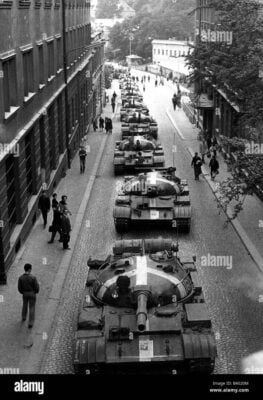
Soviet Oppression during the Prague Spring 1968 influenced much of Milan Kundera’s perspective on Czechoslovak society at the time under Communism.
The recent passing of Czech author Milan Kundera was a great loss to the literary world. Exiled to Paris for his anti-Soviet writings, Kundera’s novels explored the inner psychological effects on individuals living under Communist regimes. While focused on Czechoslovakia and the state of affairs around the time of the Prague Spring, Kundera influenced ideals of free speech and liberty in all places that suffered under political oppression. While his work was famous in Europe, much of his following came from places like Latin America, where many of his readers grew up in the shadow of military dictatorships from the 1960s to the 1980s. The inner mind of someone who is trying to survive is an important perspective to understand, as political oppression affects people on many different levels.
While not to the same degree, my own country has recently passed a law where much of my content, the content of FPA.org, along with all local and even international news has been removed from the majority of social media platforms throughout the nation. The effect is so extensive, that even non-media related policy reports and things as simple as the best way to cook with flower honey, is also blocked on major social media platforms in the country. While there are ways of getting around such limitations (as practiced by those who live in China and other censored national grids), free speech and the ability to share ideas, whether they be critical of society or supportive of policy, needs to be given the maximum level of distribution, lest the Government seeks to passively limit such criticism.
Lessons from those like Milan Kundera, or Polish filmmaker Krzysztof Kieslowski, seek to not only highlight the plight of those living under left wing Communist dictatorships and Far Right military dictatorships, but serve as a lesson to never repeat the mistakes of the recent past. The lasting effect on free speech, and missions like Radio Free Europe/Radio Liberty effectively used an outside perspective, critical of oppressive Governments, to bring down those same Governments. So effective was leaking information and the truth inside the Iron Curtain, that many regimes more recently created their own counter-narrative Government run media organisations to sow discontent and division in Western countries.
Care must be taken to establish legislation that guarantees not only free speech, but also protect state institutions from being degraded via creating a systemic bulk ward against free speech. Government supported media and fully funded media is easily degraded, and has the effect of becoming a tool for a small elite of Government officials who wish to limit any criticism or opposition. Such institutions should only exist if it can be regularly demonstrated to not only meet the local standards of free speech and liberty, but also meet an international standard as they are the voice of an entire nation. Distributing scripted lines from a Government can easily be labelled as Journalism, even when it clearly supports a small elite group. Labels against elected opposition can be used as well by the same media to limit criticism of the Government of the day, even when operating in an otherwise robust democracy. If your media attacks the opposition while constantly supporting the Government, they lack an understanding of their own role in a democracy.
While political courses often drill in the idea that “Absolute Power, Corrupts Absolutely”, the further reach of such power not only corrupts a country systemically, but is almost impossible to remove from the institutions once it infects the system. Absolutist power in reality is almost never removed, as the cure for such anti-corruption measures are often limited to using systemic tools that have already been corrupted. All Governments would prefer to operate in a system where there are no checks and balances, but such a system without checks, will never achieve any balance. Those with more money, influence and power will gain it increasingly, with the rest of us rapidly become like many of the characters in a Kundera novel, silently and secretly trying to live our lives, hoping that the regime does not decide to activate a tank battalion to crush an elected leader and a Prague Spring, or simply use banned military weapons against its own citizens. Even when an otherwise healthy democracy ignores abuses and creates relations with such regimes, the oppression from the regime seeps into the democratic institutions that are founded on principals banning such treatment of its citizens. The decay of democratic principals is one of the greatest real and persistent threats to existing democracies. Lessons of the Cold War ignored have already lead to some of the largest tank battles since 1945, and not just because its 2023.